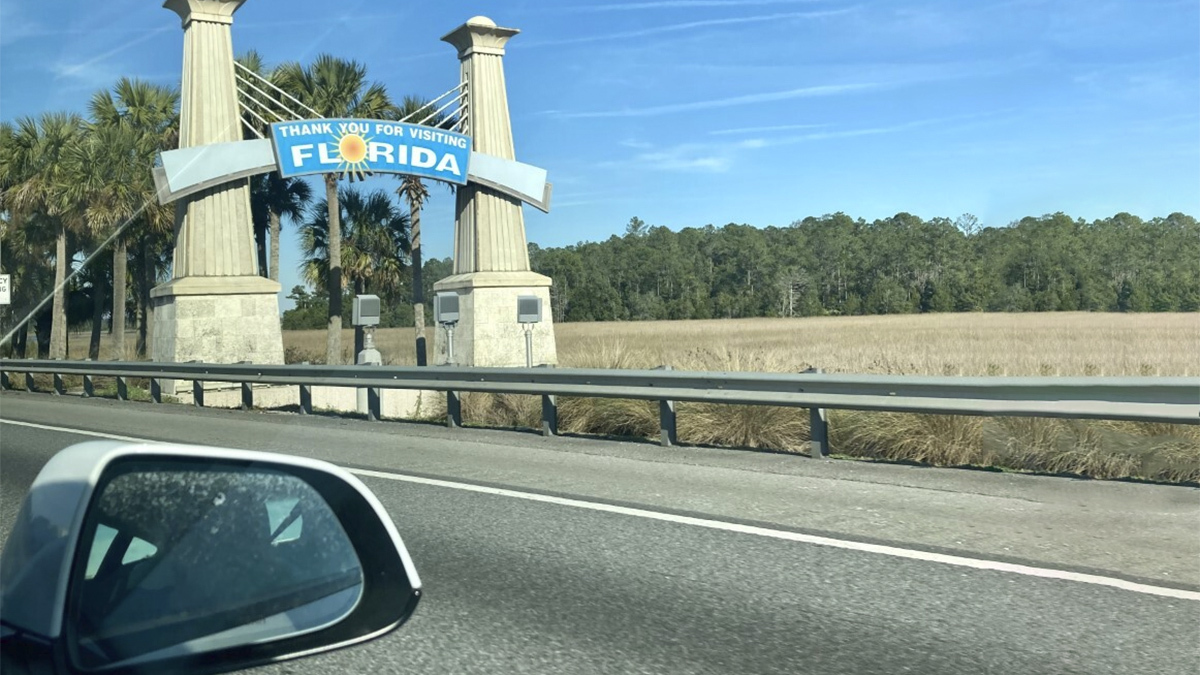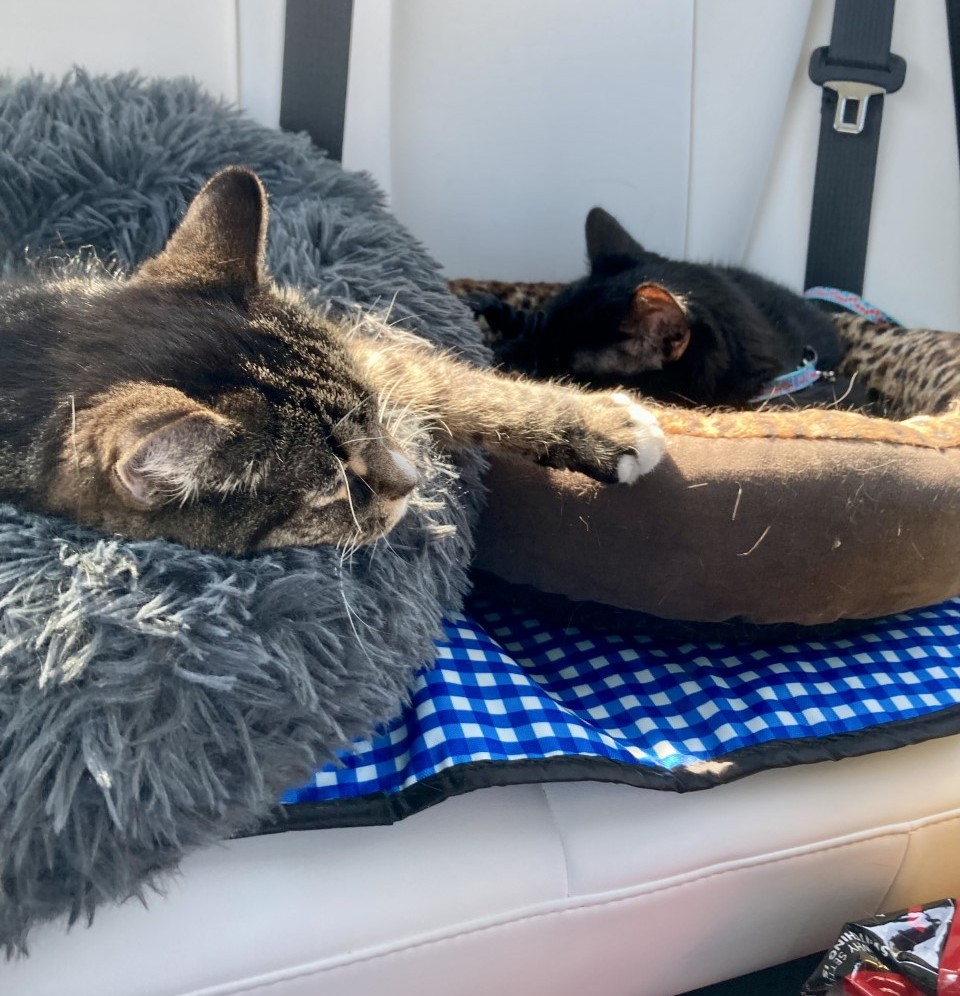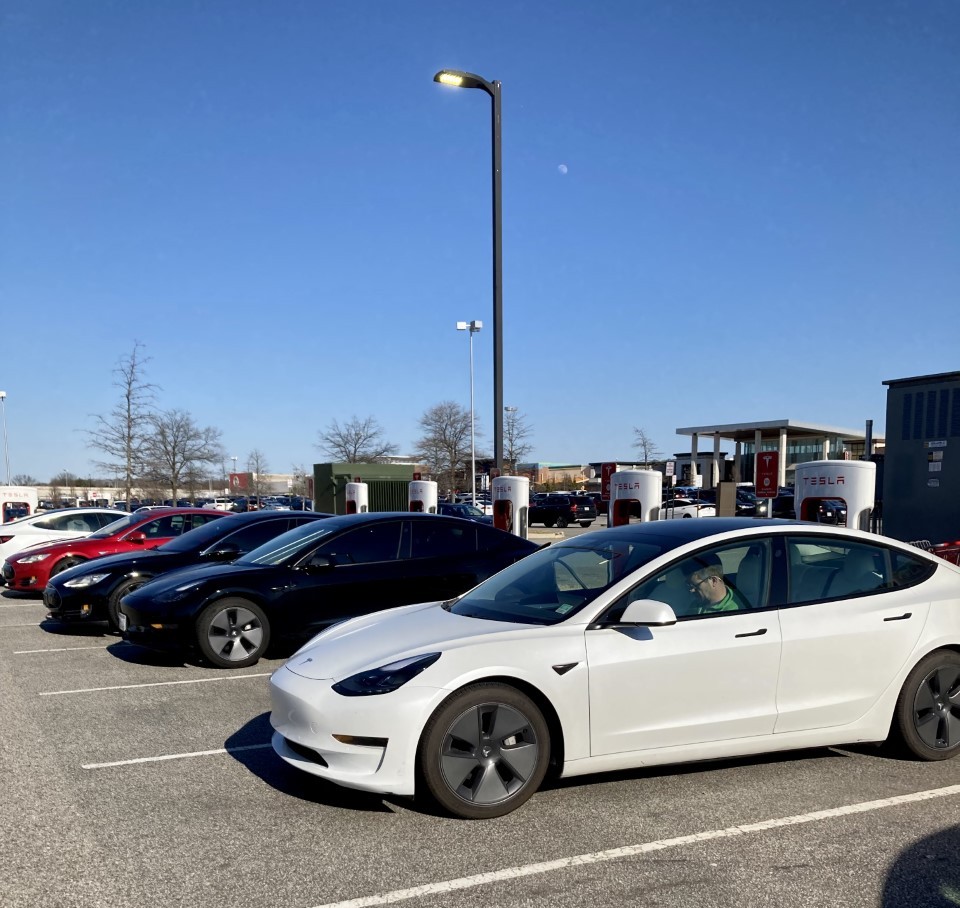
We got our Tesla Model 3 Rear-Wheel Drive, estimated range of 267 miles, in June 2021. Last autumn, we took it on its first long voyage – 10 hours round trip to Florida. It did great, so when it came time to head cross country with our two cats from Florida to New Hampshire over three days, we decided to give it a go. Here’s how it went!
Packed in
We undertook this mammoth drive because we’ve moved to New England. (Yes, we know it’s cold. No, we don’t care. We like it here.) Movers took the bulk of our stuff, and we pared our car gear down to the essentials. We put valuables – jewelry, important documents, and a fragile Victorian skeleton clock – in our frunk and shared a large suitcase that we put in the trunk, along with winter coats and boots, and cat paraphernalia. Like babies, cats travel with a lot of stuff.
Driving with two cats was initially a bit of a quandary, as the Model 3’s backseat isn’t big enough for larger animal carriers, and cats can’t sit in small enclosed carriers for three days. So we put our cats in their beds, buckled them in using retractable car seatbelts that clipped to their harnesses, and hoped for the best.
To our relief, our cat-transport strategy worked great. We have white seats in our Model 3. Seth Weintraub, Electrek‘s publisher, told me when I was about to order our Model 3 that white Tesla seats wipe clean like a charm. He knows because he’s got kids and a big dog and cats as well. So we chose white, and he was right. Just to make sure, we put wipe-clean mats on the seats, and they came out unscathed. We also have rubber floor mats, which were handy for when the cats needed to use the litter box (when they gotta go, they gotta go). Here’s what our cats looked like in the backseat:

They didn’t love being in the car, but they weren’t distressed, either. They slept 95% of the time, and we breathed a sigh of relief at the end of the trip that there were no feline disasters.
What I learned: The Tesla Model 3 is a bit tight space-wise for a big road trip like this, but it’s doable. The seats are comfortable, and it’s animal-transport friendly. A big win. You don’t need an SUV to do this big East Coast drive comfortably.
Tesla Trip Planner
Tesla’s in-car Trip Planner makes any road trip easy. On the first day, we mapped from Clearwater, Florida, to Smithfield, North Carolina, where we stayed overnight in a hotel. (Next to the Supercharger. And a Dunkin Donuts. Because coffee.)

On day two, we drove from Smithfield to Chester County, Pennsylvania, where we stayed overnight with family. The car did a great job directing us through Washington, DC, traffic on a Friday afternoon. If you’ve ever driven in DC traffic, then you know that it’s not for the faint hearted. But all we had to do was look at our screen and listen carefully to voice directions. We didn’t miss a single turn or exit, even right in the heart of the city and heavy traffic.
On day three, we took a slightly different approach. Tesla wanted to take us straight through Manhattan. I lived in New York City for six years, and despite it being familiar territory, that was not my preferred route. So instead, we navigated to Tarrytown, New York, thus bypassing Manhattan, crossing the George Washington Bridge and skipping the Bronx. That’s not much fun, either, but it was better than Manhattan. So we kind of forced it to reroute us, and that worked fine. Once we left Tarrytown, we reset the route planner to Hanover, New Hampshire, and it was a straight, uncomplicated shot to New England.
What I learned: Your car, for the most part, will get you from point A to B efficiently. Like with the Manhattan rerouting experience, sometimes you have to route from stop to stop, rather than to your final destination, to force a route you want, but it was easy.
Performance-wise, everything in the car worked fine, bar about five minutes where the screen froze and then rebooted itself while we were driving through South Carolina in the dark. It was a bit unnerving, but we knew what was happening. We also knew how to manually reboot the computer if necessary – hold down both scroll buttons on the steering wheel until it reboots – and knew it could be done while driving.
(We didn’t use Autopilot. Don’t shout at me in the comments. We prefer to drive the car ourselves. We also don’t have Full-Self-Driving.)
Supercharging from Florida to New Hampshire

The overall Supercharging experience is great, period. People ask whether it’s annoying to have to stop for anywhere from 15 minutes to a half hour, and it’s not. It’s better to be able to walk, stretch, go to the bathroom, and get food and drinks. Plus, charging never held us up; it just encouraged us to do what we should do anyway. We never had to wait for charging to finish.
My Favorite Supercharger Award goes to Mount Laurel, right on the New Jersey Turnpike. It had clean bathrooms, Starbucks, a variety of food choices, was easily spotted from the road, and featured plenty of bays with no wait. (In fact, we never had to wait our turn to charge the entire trip.)
The Most Eccentric Tesla Supercharger Award goes to Summerton, South Carolina. It was easily spotted from the ramp, thanks to the red glow of the chargers since it was nighttime, but they sat next to a Stuckey’s that looked (and smelled) like it hadn’t been updated since 1956. We sat in the car eating snacks, listening to frogs, and watching stray cats run around the parking lot. It did the job, as it had a bathroom and drinks, but it was a little weird.
Cost-wise, the drive was free for us, because we had referral miles. Gas prices were all over $3.50 a gallon, so our trip, even if we’d paid for charging, still would have cost less than if we’d been driving a gas car.
What I learned: Tesla Supercharging is a seamless, easy experience that doesn’t delay your road trip. We got great range overall, never got anywhere near running out of charge, and set the speed limit to 80 mph so we didn’t get pulled over for speeding. (The car dinged us for coming close to 80 mph about 50 times, so clearly we needed that limit.)
However, there are two things that I’d really like to see Tesla do, going forward.
One, I’d love to see Tesla Superchargers under solar canopies. Then, you’d know you were charging with clean energy, and they’d also be easier to spot.
Which leads me to the only thing that we found annoying: the lack of signage directing Tesla drivers to Superchargers. Sure, your car directs you to the Superchargers. But more often than not, we had to play Easter egg hunt, because the car doesn’t tell you exactly where they are, and it’s not always intuitive to find them.
If Tesla would install signage at the interstate exit, and then more signs with arrows directing you to the actual Supercharger, that would make a huge difference. They’re almost always tucked way in the back of wherever, and more than once we ended up bickering and driving in circles because we couldn’t find them. I had to do Google Image searches to discover that, “Oh, they’re behind the Hardee’s, not the barbecue joint, like the Tesla website wrongly says.”
Flag Superchargers with big signs, Tesla, and it’ll boost the brand and the visibility, and thus confidence in the Tesla-curious yet range anxious, that there really are places to charge. The red glow helps, but if Superchargers were coupled with signs, it would make a huge difference. If McDonald’s can get the attention of motorists with giant telescopic signs hundreds of feet in the air, then Tesla can install some signs, too.
Read more: 3 things I learned on a rural Florida road trip in my Tesla Model 3
Photos: Michelle Lewis
FTC: We use income earning auto affiliate links. More.






Comments